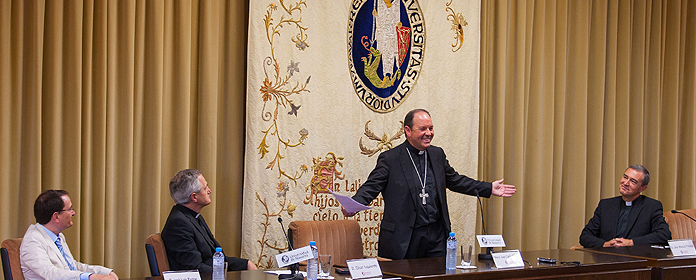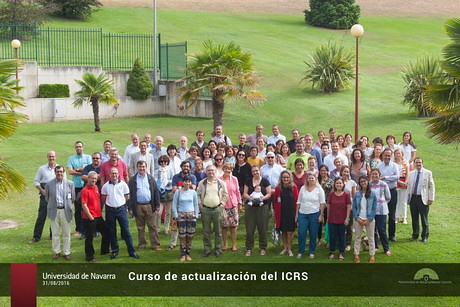Bishop Juan Carlos Elizalde: "Human life has an Easter structure: illusion, disillusionment, fulfilment".
The bishop of Vitoria closes the XIII Course of update of the ISCR of the University of Navarra in which a hundred people participated

"Human life has a Paschal structure: illusion, disillusionment, fullness". This was stated by the Bishop of Vitoria, Mons. Juan Carlos Elizalde , during the closing ceremony of the XIII Course of update of the high school Superior of Religious Sciences (ISCR) of the University of Navarra, centered on 'Theological and pedagogical questions of the present time'.
The Bishop of Vitoria, and former student of the University of Navarra, focused his exhibition on 'Christian existence: meaning, sources and richness'. During the same, he recalled that the following of Jesus is not by accumulation, but by transformation, so that "the crisis is a sign that we are living in fullness. He added that we cannot fall into the temptation to stop loving: "Jesus gave everything in the crisis".
Likewise, Bishop Juan Carlos Elizalde stressed the importance of each person knowing the mark he leaves with his existence: "Each one must know his unique and unrepeatable characteristics, his charism. If one does not find it, everything overshadows him and he falls into desolation".
The program, which began on Monday, August 29, with the participation of director José Manuel Fidalgo, director of high school, was attended by a hundred people from 13 Spanish autonomous communities: Community of Madrid (24), Andalusia (23), Catalonia (13), Basque Country (12), Navarra (7), Extremadura (6), Valencian Community (5), Castile and Leon (3), Murcia (3), Aragon (1), Asturias (1), Cantabria (1) and La Rioja (1). The profile of the attendees is very varied, such as teachers, administrative staff, priests, catechists, engineers, retired people or housewives.
11 sessions of training on 'Current theological and pedagogical issues'.Fernando Milán, professor of Old Testament at the University of Navarra, was in charge of inaugurating the sessions with a talk on 'Jesus and Prophecy' at discussion paper . Professor Juan Luis Caballero, professor of New Testament, gave the next talk, which dealt with 'The first Christian writings and the message of Jesus'. The last session of the morning was given at position by Francisco Varo, director of the Diploma online Biblical Theologywith the discussion paper 'The Bible in the world of young people: challenges and opportunities'.
In the afternoon, Vicente Balaguer, professor of New Testament at the University of Navarra, offered two sessions: 'La Sacred Scripture y la Revelación Divina' and 'Claves para una interpretación cristiana de la Biblia.
The sessions of the second workshop began with Reyes Duro, from high school of Anthropology and Ethics, who spoke on 'The iconography in the works of mercy: the evangelizing power of the image' and Mari Carmen González Torres, professor of Developmental Psychology and of the Education, on 'Resisting the siren songs while studying: working with students on strategies of volitional control and encouraging their self-motivation in learning'.
At 12 noon, the Episcopal Vicariate of teaching, with Abel Arrieta and Eduardo Mayor, offered a session on 'Educational projects in the area of religion'. In the afternoon, Santiago Martínez, professor of Contemporary History at the University of Navarra, gave a session on 'Religion and Power: the Middle East and the West'.
Javier Bernácer, researcher of high school of Culture and Society (ICS), gave the first lecture on Wednesday, August 31, the last workshop of the course, under the title degree scroll 'Techniques and current issues in neuroscience'. Next, José Manuel Giménez Amaya, professor at group of research Science, Reason and Faith (CRYF), addressed 'An example to show the materialist failure: mind-brain relations'.

